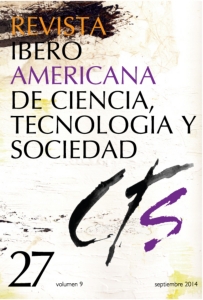University research in the democratization of knowledge
DOI:
https://doi.org/10.52712/issn.1850-0013-581Keywords:
university, research, knowledge, democratizationAbstract
The democratization of knowledge is seen as a set of processes that are needed to face trends towards the solution of growing inequality. As an example of such processes, some university research policies are analyzed in this paper. It is asserted that, particularly in Latin America, connecting directly the generation of high level knowledge with its socially useful utilization may be an efficient strategy for expanding research.
Downloads
References
ALZUGARAY, S., MEDEROS, L. y SUTZ, J. (2012): “Building Bridges. Social inclusion problems as research and innovation issues”, Review of Policy Research, vol. 29, nº 6, pp. 776-796.
AROCENA, R. Y SUTZ, J. (2010): “Weak knowledge demand in the South: learning divides and innovation policies”, Science and Public Policy, pp. 571,582.
AROCENA, R. Y SUTZ, J. (2013): “Innovación y democratización del conocimiento como contribución al desarrollo inclusivo”, en G. Dutrenit y J. Sutz (eds.): Sistemas de Innovación para un Desarrollo Inclusivo. La experiencia latinoamericana, Foro Consultivo Científico y Tecnológico, México, pp. 19-34.
AROCENA, R. (2013): “Las Políticas de Educación Superior en la Democratización del conocimiento”, Horizontes Latinoamericanos, vol. 1, nº 1, pp. 9-20. Disponible en: http://periodicos.fundaj.gov.br/HLA/
CIMOLI, M., FERRAZ, J. C. y PRIMI, A. (2009): Science, Technology and Innovation Policies in Global Open Economies: Reflections from Latin America and the Caribbean, vol. 3, nº 1, Georgetown University.
BIANCO, M. y SUTZ, J. (2014): Veinte años de políticas de investigación en la Universidad de la República: aciertos, dudas y aprendizajes, CSIC-TRILCE, Montevideo.
DAHL, R. (1985): A Preface to Economic Democracy, University of California Press, Berkeley.
DAHL, R. (1989a): La poliarquía. Participación y oposición, Tecnos, Madrid.
DAHL, R. (1989b): Democracy and its critics, Yale Univ. Press, New Haven.
DE LA MOTTE, J. y PAQUET, G. (1996): Evolutionary Economics and the New International Political Economy, Pinter, Londres.
DUNN, J. (2005): Democracy. A History, Nueva York, Atlantic Monthly Press.
KOHLI, A. (2003): “Democracy and development: Trends and prospects”, en A. Kohli, Ch. Moon, and G. Sørensen (eds.): States, markets and just growth: development in the twenty-first century, The United Nations University, Nueva York, pp. 39-63.
LUNDVALL, B. A. y JOHNSON, B. (1994): “The Learning Economy”, Journal of Industry Studies, vol. 1, nº 2, pp. 23-42.
RODRIK, D. (2007): One Economics, Many Recipes: Globalization, Institutions, and Economic Growth, Princeton Univ. Press, Princeton.
SAGASTI, F. (2013): Ciencia, tecnología, innovación. Políticas para América Latina, Fondo de Cultura Económica, Lima.
SARTORI, G. (1988): La teoría de la democracia, Alianza Editorial, Madrid.
SEN, A. (2000): Desarrollo y libertad, Editorial Planeta, Barcelona.
STIGLITZ, JOSEPH (2012): The Price of Inequality, Norton, Nueva York.
SUTZ, J. y TOMASSINI, C. (2013) “Knowledge, innovation, social inclusion and their elusive articulation: when isolated policies are not enough”, International Seminar “New Models of Innovation for Development”, Manchester University.
TILLY, C. (2005): Identities, Boundaries, and Social Ties, Paradigm Publishers, Boulder, Colorado.
Downloads
Published
How to Cite
Issue
Section
License
Copyright (c) 2024 CC Attribution 4.0

This work is licensed under a Creative Commons Attribution 4.0 International License.
All CTS's issues and academic articles are under a CC-BY license.
Since 2007, CTS has provided open and free access to all its contents, including the complete archive of its quarterly edition and the different products presented in its electronic platform. This decision is based on the belief that offering free access to published materials helps to build a greater and better exchange of knowledge.
In turn, for the quarterly edition, CTS allows institutional and thematic repositories, as well as personal web pages, to self-archive articles in their post-print or editorial version, immediately after the publication of the final version of each issue and under the condition that a link to the original source will be incorporated into the self-archive.











